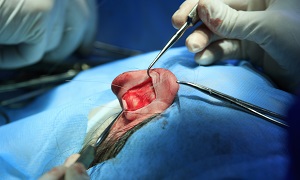Otoplasty
Otoplasty, also termed as cosmetic ear surgery is a procedure for changing the shape, position or size of one’s ears. Otoplasty is chosen if one is not pleased with how far their ears stick out. It helps to build up or repair the outer ear, for people who were born with ear-shape problems or a person who has sustained ear damage.
Otoplasty can be done at any age usually after the age of five after a child’s ears have reached their full size. In some cases, the surgery is even done as early as at the age of three.
Purpose
The outer ear has a minor function in hearing, and it also contributes to a person’s physical appearance. When a person feels that their ears are too prominent, it causes embarrassment as well as psychological distress. According to some research, this can lead to low self-esteem, as well as low self-confidence.
The procedure is typically done on both the ears for optimizing the symmetry. Otoplasty can be performed at any age after the ears have reached their full size, usually after the age of five. It is also notable that otoplasty does not change the location of the ears nor does it alter one’s ability to hear.
Preparation
At first, you will need to consult with a plastic surgeon about the procedure. During your first visit, it is likely that your plastic surgeon will:
- Review your medical history- Keep in mind that you need to be prepared to answer questions about your current as well as past medical conditions, especially any kind of ear infection. If you are taking any medications or you’ve taken any recently, you need to discuss this with him/her. You also need to discuss past surgeries if you’ve had any.
- Do a physical exam- For determining your treatment options, the doctor will examine your ears, which will include their placement, size, shape and symmetry. The doctor may also need to take pictures of your ears for your medical record.
- Discuss your expectations- You need to explain why you want the surgery and what you’re expecting in terms of appearance after the procedure. Also, make sure that you understand that there might be a few risks as well.
If the doctor sees you as a good candidate for otoplasty, he/she may recommend you for taking some steps to prepare for the surgery.
- Food and medications- You might need to avoid a few medications such as aspirin, anti-inflammatory drugs as well as herbal supplements, which can increase bleeding.
- Other precautions- You might need to stop smoking before the surgery, as smoking decreases blood flow in the skin, and this slows down the healing process.
Try to make sure that someone can drive you home after your surgery, as well as stay with you at home for the first night of your recovery.
The surgery is usually done at a hospital or sometimes at an outpatient surgical facility. The procedure is done with sedation and local anesthesia, which nulls a part of your body. However, in some cases, general anesthesia, which can render you unconscious, might also be given before the procedure.
Procedure
Otoplasty techniques can vary depending on what kind of correction is required. The special technique which your plastic surgeon will choose will determine the location of your incisions and the resulting scars.
Your doctor can make incisions on the backs of your ears, or within the inner creases of your ears. After the incisions are made, the doctor may remove excess cartilage and skin. He/she will fold the cartilage into the proper position and then secure it with internal stitches. Additional stitches will be used for closing the incisions.
This procedure usually takes around two hours.
After the procedure
After the otoplasty, your ears will be covered in bandages for protection as well as support. You might feel a little discomfort as well as itching. You can take pain medications as your doctor recommends. However, if your discomfort increases after you take the pain medication, talk to your doctor.
Avoid sleeping on your side in order to keep pressure off your ears. Try not to rub or place excessive force on the incisions. Also, consider wearing button-down shirts or shirts having loose-fitting collars.
Your bandages will be removed by your doctor a day after your otoplasty. Your eyes may be swollen or red. Wearing a loose headband to cover your ears at night for few weeks can help in keeping you from pulling your ears forward when you roll over in your bed.
Some stitches can dissolve on their own while others need to be removed in the doctor’s office a few weeks after the procedure. Ask your doctor regarding when it is okay to resume your daily activities like bathing.
After your bandages have been removed, you will notice the change in the appearance of the ear or ears. These changes are going to be permanent. However, if the results of the surgery are not satisfactory, you can check with your surgeon regarding the possibility of a revision surgery.
Risks & complications
Otoplasty is usually quite safe as well as successful, and it also has high satisfaction rates. According to researchers in Germany, people usually have a better quality of life after they undergo otoplasty for reducing the prominence of their ears.
However, like all other surgeries, this surgery also has few risks and might lead to certain complications in a few cases. This can include-
- Infection: Like any other surgeries, there is a small risk of infection. If the patient however receives prompt treatment with antibiotics, this can help in preventing further complications.
- Numbness: In a few cases, the ears can become totally numb for several weeks after the surgery.
- Bruising: A hematoma, or blood clot, may sometimes form under the skin of the ear. This can appear 1–3 days after your surgery.
- Unsatisfactory appearance: Sometimes, the results of cosmetic surgery do not match the person’s expectations. The ears may be asymmetrical in some cases, or too close to the head, or too far from it.
- Recurrence: In a few cases, the ears might start to stick out again, which can lead to the requirement for revision surgery.



